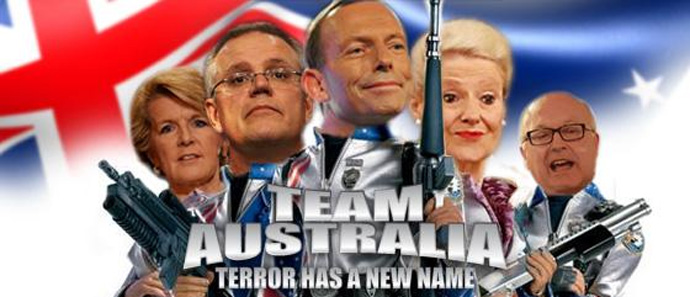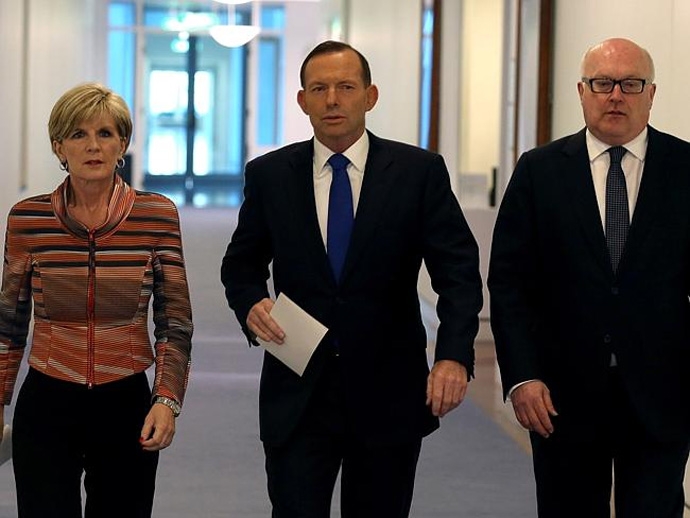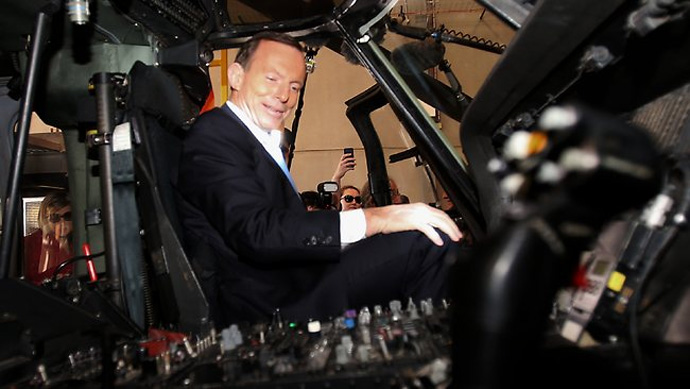Abbott uses 'smoke and mirrors' as he backs out of Racial Discrimination Act changes
Tony Abbott tried to distract from the backdown of his governments proposed Racial Discrimination Act changes by announcing what appears to be another step towards an incarnation of a new Fascism - to be known as 'Team Australia'.

Yesterday Mr Abbott dropped plans to repeal section 18C of the Racial Discrimination Act, saying the debate had complicated relations with ethnic groups.
Mr Abbott said consultation with all groups, including the Muslim community, must not be jeopardised by the changes and they were therefore taken off the table.
The federal government's plan to beef up counter-terrorism measures, which will allow the collection of telecommunications data, is an unjustified power grab, civil liberties groups say.
Spy and police agencies will get $630 million to implement tough new laws to deal with Australians who fight, train with or support terrorist groups overseas.
More below ...
The repeal of 18C, an Abbott government election commitment, has been widely criticised as a watering down of protections against racism.
Section 18C of the act makes it unlawful to offend, insult, humiliate or intimidate another person or a group of people because of race, colour or national or ethnic origin.
More than 5500 submissions flooded into the Attorney-General's office following the release of draft laws in March.
Only a handful have been released but the majority reportedly opposed the changes.
An April poll published by Fairfax Media showed 88 per cent of respondents believed it should be illegal to offend, insult or humiliate someone based on their race.
Coalition backbenchers joined the opposition, and Labor leader Bill Shorten says that’s why the "deeply unpopular" changes have been ditched.
"What is clear ... is that the Attorney-General has been rolled by his cabinet," Mr Shorten told reporters.
The government had been humiliated and embarrassed by the proposal, he said, which was flagged one year ago.
"This has been a dreadful waste of national energy," the opposition leader said.

'Cap in hand', Tony Abbott leads the foreign minister Julie Bishop and Attorney General George Brandis to the media slaughter house on Tuesday
The Australian Greens have repeatedly questioned the government’s motive behind the changes, after political commentator Andrew Bolt fell foul to 18C for a column questioning the motives of lighter-skinned Aboriginal people.
Mr Bolt was one of the first to comment on the government’s announcement on Tuesday, blaming the move on lobby groups who "hate free speech".
"I suspect the country will be poorer for this," he said.
Attorney-General George Brandis has previously said Australians have a "right to be bigots" when defending his changes and defended his outrageiously racist words this week.
www.skynews.com.au 6 August 2014
The federal government's plan to beef up counter-terrorism measures, which will allow the collection of telecommunications data, is an unjustified power grab, civil liberties groups say.
But Prime Minister Tony Abbott says the rising number of Australian passport holders heading to conflict zones in places like Syria and Iraq means it has little choice but to act.
'What we are now acutely conscious of is the danger posed back here in Australia by people returning to Australia who have been radicalised and militarised by the experience of working with terrorist organisations overseas,' he said on Tuesday.
'The first duty of government is to keep our community safe.'
Spy and police agencies will get $630 million to implement tough new laws to deal with Australians who fight, train with or support terrorist groups overseas.
Intelligence officials say the conflicts in Syria and Iraq have drawn about 10,000 fighters from around the world.
Some 150 Australians are directly linked to the Syrian conflict, including those sending money or recruiting fighters.
About 60 Australians are known to be fighting in Syria or Iraq, and 15 have been killed.
The government has cancelled the passports of 51 people it suspected of planning to join the conflicts.
Under the proposed new laws, the government will blacklist areas so people who travel to these zones will have to prove they went for humanitarian or family reasons, not to fight.
Details of how this would work are still being developed, but the government says it won't reverse the legal onus of proof.
However, a senior intelligence official said it would be prudent for persons, such as a Red Cross worker, going to Syria to think about how they might create evidence of what they were doing overseas.
The laws to be introduced to the parliament in the Spring sittings will:

This is the Australian Prime Minister - Heaven Help Us!
(Photo: Gary Ramage Source: TheAustralian)
broaden the listing criteria for terrorist organisations to ensure advocacy of terrorist acts includes the promotion and encouragement of terrorism.
make it easier to arrest terrorists by lowering the threshold for arrest without warrant for terrorism offences.
extend the Australian Security Intelligence Organisation's (ASIO) questioning and detention powers beyond the July 2016 expiry.
extend Australian Federal Police stop, search and seizure powers in relation to terrorist acts and offences beyond December 2015.
make it easier to prosecute foreign fighters.
make it an offence to participate in terrorist training.
enable ASIO to request the suspension of an Australian passport or foreign passport for a dual national.
The government also plans to make telecommunication companies hold onto customer metadata for two years for law enforcement purposes.
The information can include phone numbers called, the time, date and duration of a call, the cell tower area and possibly the name and contact details of customers.
The relevant legislation will be introduced later this year, after consultation with the telecoms sector.
Opposition Leader Bill Shorten will consider the new laws carefully but has so far signalled bipartisan support.
'Our security agencies need to have the right powers to keep Australia and Australians safe,' he said.
'Australians who travel overseas to fight for terrorist causes should face the strongest weight of the law for their actions.'
The Australian Greens will await the legislative detail but has expressed concerns about the erosion of human rights and the justice system - thoughts echoed by the Australian Council for Civil Liberties (ACCL).
'The measures represent an attempt to use the current problems of Australians fighting with terrorist groups as a power grab for extra powers, the need for which is not currently made out,' ACCL president Terry O'Gorman told AAP.
Mr Abbott denies such claims and is seeking community support for the changes.
'When it comes to counter-terrorism, everyone needs to be part of team Australia,' he said.
Mr Abbott has made a 'leadership call' to scrap the government's planned changes to Racial Discrimination Act, which would have softened laws on bigotry and hate speech, to encourage the support of ethnic groups.
'I want the communities of our country to be our friends, not our critics,' he said.


